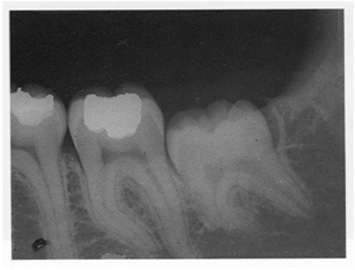Impacted tooth (Unemerged tooth, Dental Impaction, Sleeping tooth)
Teeth emerge through the gums during infancy (Primary / milk tooth) and are later replaced by the permanent teeth. If tooth fails to erupt or is partially erupted, it is called an impacted tooth. Wisdom teeth are the most commonly impacted teeth.



Procedure of removal of Impacted Lower Wisdom Tooth

Procedure of removal of Impacted Upper Wisdom Tooth

Procedure of removal of Impacted Upper Canine Tooth
Many people don’t have enough ‘space’ in the jaws for the wisdom teeth to erupt into a proper, healthy position. This results in misaligned wisdom teeth that is partially erupted through the gums, or not erupted at all.
Self-examination will reveal:
Wisdom tooth should be extracted in following conditions:
Wisdom tooth should not be extracted in following conditions:
Impacted tooth may not cause problems for some peopleand may never require treatment. Teeth which are symptomatic may require removal and this usually relieves the symptoms. It is often preferable to have wisdom tooth removed at a younger age as the bone is softer allowing easier extraction and better healing.
Wisdom tooth removal is absolutely painless. Some patients may experience mild pain and discomfort later on the day of extraction or next day. This depends on:
You will likely be given a prescription for painkillers. Take them as directed and you will be relieved of your pain.
You will experience swelling around your jaws and face after the surgery, which generally increases on the first two succeeding days, following which it tends to subside. Swelling can vary from person to person and according to degree of difficulty of surgery. Even patients who have had similar extractions can have quite different swelling.
Yes. Preferably every patient is advised to take rest for a period of 24 hrs following surgery.
Infection after having your wisdom teeth extracted (or even a simple extraction) is not common but can occur. Your doctor will decide whether antibiotics are necessary after the surgery.
It is common to see blood in your saliva for several hours after the extractions. This is because the extraction sockets may ooze small amounts of blood for the first few hours after the surgery. However, significant bleeding after wisdom teeth extractions is very uncommon.
Smoking before and after surgery can cause dry socket or delayed healing. You should stop smoking completely until the extraction sockets heal, which may take couple of weeks.
Generally, simple and uncomplicated procedures are usually performed under local anesthesia. However, patients with low pain tolerance and requiring complicated procedures are done under sedation or general anesthesia.
Some difficulty in opening your mouth wide is expected from the 1st post surgery day of the surgery, but this will gradually return to normal. Mouth opening exercises will definitely help open the mouth earlier. Some patients experience difficulty or soreness when swallowing or may run a temperature for a day or so.

Nerve running close to the roots of impacted wisdom tooth
The roots and jawbone surrounding the lower wisdom teeth can be positioned very close to the nerves that supply sensation to your chin, lip, and tongue. While removing lower wisdom teeth, these nerves can sometimes be stretched or damaged so that even after the local anesthetic wears off, you will feel the numbness or an altered sensation in your chin and/or lip and/or tongue. However, permanent numbness is a extremely rare condition and generally this condition heals by itself over a period of time.

Roots of upper teeth are sometimes very close to the maxillary sinus floor
Some times the root of the upper teeth may be in close vicinity or within the maxillary sinus and during the procedure of extraction a communication may occur between the oral cavity and the antral environment. This leads to passage of liquid through the oral cavity into the sinus and discharge through the nose. This may heal by itself or can be managed efficiently by the oral surgeon.